Responsible procurement has evolved from a mere corporate buzzword to a crucial aspect of modern business practices. With increasing global awareness surrounding sustainability, ethical sourcing, and corporate social responsibility, industrial companies are under mounting pressure to adopt responsible procurement strategies.
In this article, we delve into the current trends, key certifications, and the future landscape of responsible procurement, providing valuable insights for procurement professionals and industrial businesses alike.
3 Current Trends in Responsible Procurement
🧩 Sustainability and Environmental Impact
Sustainability lies at the heart of responsible procurement efforts. Industrial companies are progressively focusing on reducing their environmental footprint by sourcing eco-friendly materials, minimizing waste, and implementing sustainable logistics practices. This shift is propelled by both regulatory mandates and consumer demand for environmentally conscious products.
🔎 Ethical Sourcing and Labor Practices
Ethical sourcing ensures that products and materials are procured from suppliers that adhere to safe working conditions and fair labor practices. This encompasses eradicating child labor, ensuring fair wages, and maintaining safe working environments. Companies are increasingly vigilant about the labor practices of their suppliers to mitigate reputational risks and legal liabilities.
🔄 Transparency and Traceability in the Supply Chain
Transparency and traceability are pivotal for responsible procurement. Stakeholders demand visibility into the supply chain to ensure ethical practices and sustainability. Technologies like blockchain facilitate transparent and immutable records of the supply chain, fostering trust and accountability among stakeholders.
Key Certifications for Responsible Procurement
When it comes to choosing suppliers, it’s not always easy to find who has the best environmental practices and could be an asset to our offer. More and more companies revendicate labels and certifications which are more or less valuable depending on our objectives as customers. Let’s discover the best labels we have on the market today and compare which are more valuable :
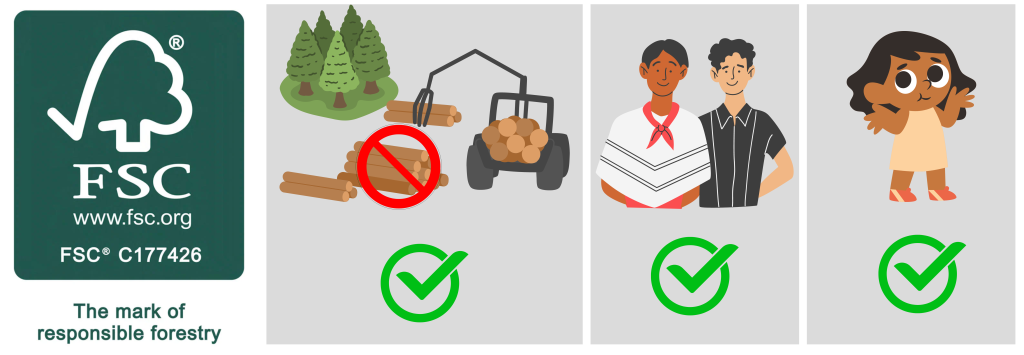
Forest Stewardship Council (FSC)
FSC certification is widely regarded as one of the most reputable labels for sustainable wood and paper products. It guarantees that products originate from responsibly managed forests, providing environmental, social, and economic benefits. FSC certification assures consumers of no illegal logging, protection of indigenous rights, and prohibition of child labor.
How to check FSC Compliance ? The license code allows you to verify FSC compliance. You can find this license code either on the invoice you’ve received from an FSC certified supplier or listed in the on-product label, which can be found on the FSC product or its packaging.
Search the license code on the FSC database to check the compliance of your supplier’s certification: FSC Database
Make sure to check it regularly as FSC is verified every year through an annual audit.
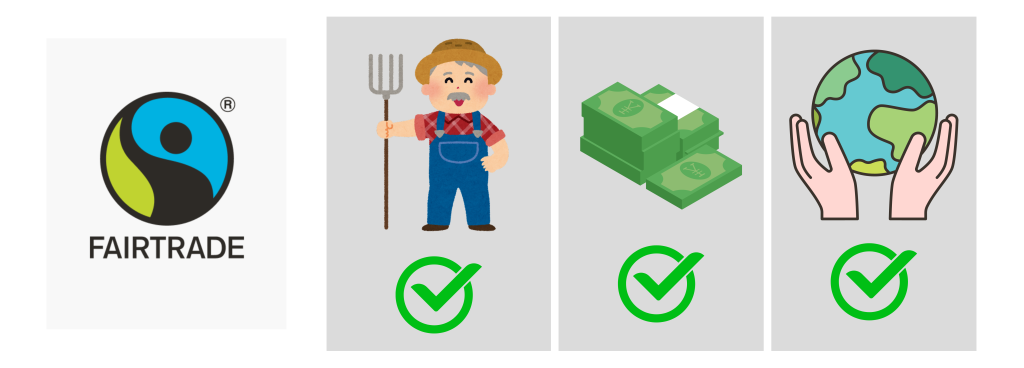
Fair Trade Certification
Fair Trade certification focuses on improving the livelihoods of producers in developing countries. It ensures fair wages, safe working conditions, and sustainable production practices. Products bearing the Fair Trade label are associated with social and economic benefits for small-scale farmers and workers.
“If you are a producer, trader, importer, exporter, or manufacturer, you must get certified, which means going through an audit process that will give you the right to trade Fairtrade-certified products in bulk.” www.fairtrade.net
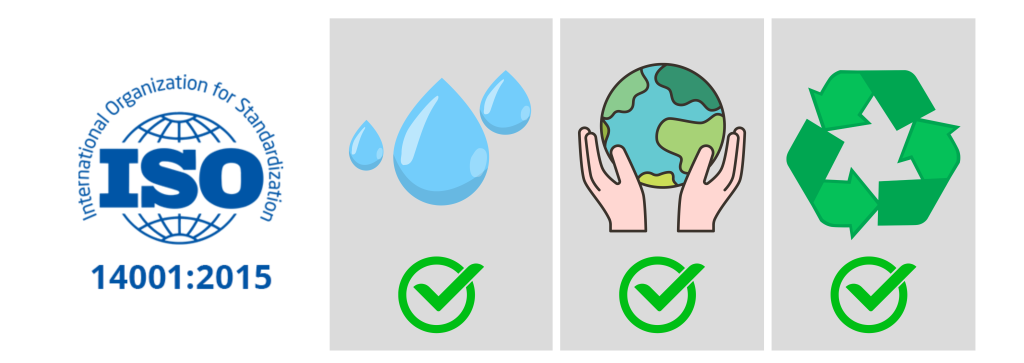
ISO 14001
ISO 14001 is an internationally recognized standard for environmental management systems. It aids organizations in enhancing their environmental performance by efficiently utilizing resources and reducing waste. While ISO 14001 primarily addresses environmental concerns, it underscores a company’s commitment to minimizing its environmental impact.
The standard encourages companies to consider all of their environmental impacts, including:
- Emissions and the processes to identify, monitor, and control them
- Water and sewage issues
- Waste management
- Soil contamination
- Climate change mitigation and adaptation measures
- Resource use and efficiency
Like many other ISO standards, companies applying the standard can be certified by an independent body. Certified organizations are typically subjected to annual surveillance audits and a recertification audit every three years.
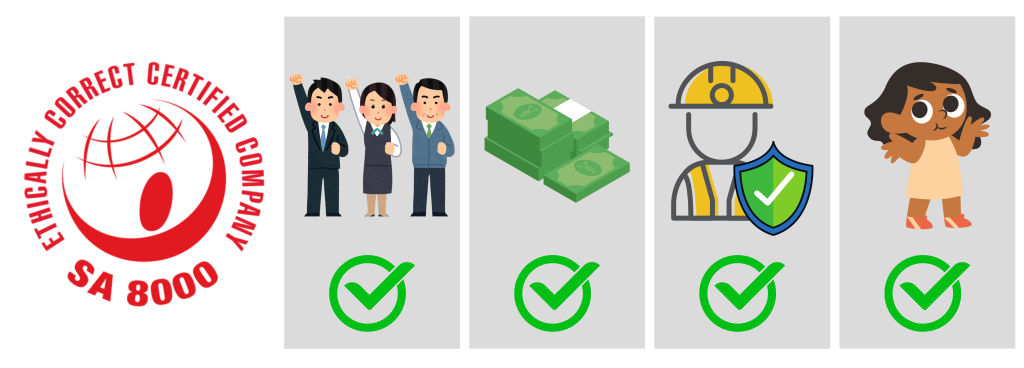
SA8000
The SA8000 Standard is a social certification standard that encourages organizations to uphold socially acceptable practices in the workplace. It covers areas such as child labor, forced labor, health and safety, and fair remuneration, providing a comprehensive framework for ethical sourcing.
The SA8000 standard certification is given by an independent third-party certification body and is valid for three years, subject to on-site surveillance monitoring.
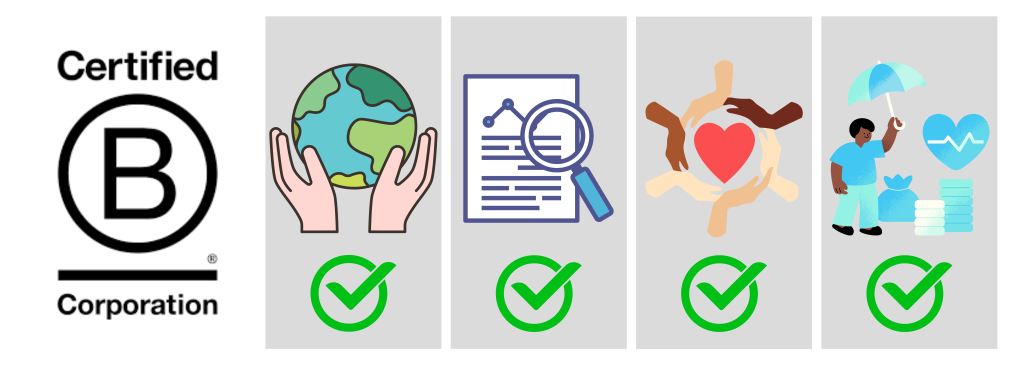
B Corporation (B Corp) Certification
B Corp certification is bestowed upon companies that meet stringent standards of social and environmental performance, accountability, and transparency. It encompasses employee benefits, charitable contributions, supply chain practices, and input materials.
To remain certified, B Corps must renew their certification every three years. All B Corps certified companies can be found on the official B Corp website: B Corp Directory.
Comparison of Certifications
- FSC and Fair Trade certifications are renowned for their stringent environmental and social criteria.
- ISO 14001 primarily focuses on environmental impact, whereas SA8000 comprehensively addresses labor practices and working conditions.
- B Corp certification offers a balanced evaluation of social and environmental practices.
These certifications provide additional assurances such as prohibiting child labor, ensuring fair wages, and maintaining safe working conditions, which are imperative for responsible procurement.
Environmental Compliance Obligations for Businesses in British Columbia in the Coming Years
The province of British Columbia, located on the west coast of Canada, is renowned for its natural beauty and environmental richness. Faced with increasingly pressing issues related to climate change and biodiversity conservation, the government of British Columbia has established environmental compliance obligations for businesses operating within its territory. These obligations are expected to expand in the years to come, and industrial enterprises must prepare to comply with them.
☁️ Reduction of Greenhouse Gas (GHG) Emissions
With the adoption of the CleanBC Plan, British Columbia has committed to significantly reducing its greenhouse gas emissions. Businesses, particularly those in industrial sectors, will be subject to stricter requirements for reporting and reducing GHG emissions. This may include emission quotas, carbon taxes, and financial incentives to encourage the adoption of more sustainable practices.
🐤 Protection of Ecosystems and Biodiversity
British Columbia is home to exceptional biodiversity, ranging from coastal rainforests to mountain ecosystems. Businesses must ensure that their activities do not have adverse effects on these fragile ecosystems. This may involve measures to conserve natural habitats, implementation of ecological restoration plans, and compliance with regulations for the protection of wildlife and flora.
♻️ Sustainable Management of Natural Resources
Responsible management of natural resources is a major issue in British Columbia, where forestry, mining, and hydroelectric industries are significant. Enterprises will be required to implement sustainable exploitation practices, waste reduction measures, and conservation of natural resources. This may involve obtaining environmental certifications, such as FSC certification for forest products.
🗑️ Waste Management and Pollution Control
Waste management and pollution prevention will become increasingly important concerns for businesses in British Columbia. Stricter regulations on waste treatment, recycling, and chemical management will be implemented to protect air, water, and soil quality. Enterprises must invest in advanced technologies and establish effective environmental management programs to comply with these regulations.
In summary, businesses operating in British Columbia can expect increased environmental compliance requirements in the years to come. By adopting sustainable practices and investing in environmentally friendly technologies, they can not only comply with these obligations but also contribute to the preservation of the environment for future generations.
Important Dates for Environmental Compliance in British Columbia:




Challenges and Solutions
Common Obstacles
- Resistance to organizational change
- High costs associated with implementing new technologies and certifications
- Complexity of managing a diverse and global supply chain
Practical Solutions
- Implementation of training and change management programs
- Utilization of technology grants and subsidies
- Collaboration with certification bodies to streamline processes
The Future Landscape of Responsible Procurement
Moving forward, responsible procurement will continue to evolve in response to escalating regulatory pressures and technological advancements. Companies must remain agile, embracing innovative practices and technologies to maintain their competitive edge and meet the escalating demands for sustainability and ethical practices. The role of procurement professionals will expand, necessitating proficiency in technology, data analysis, and sustainability.
Conclusion
Responsible procurement is not just a trend; it is a necessity for modern businesses. By focusing on sustainability, ethical practices, and following key certifications, companies can build strong and clear supply chains. In the future, responsible procurement will become even more important, and businesses that lead in this area will be set up for long-term success.
